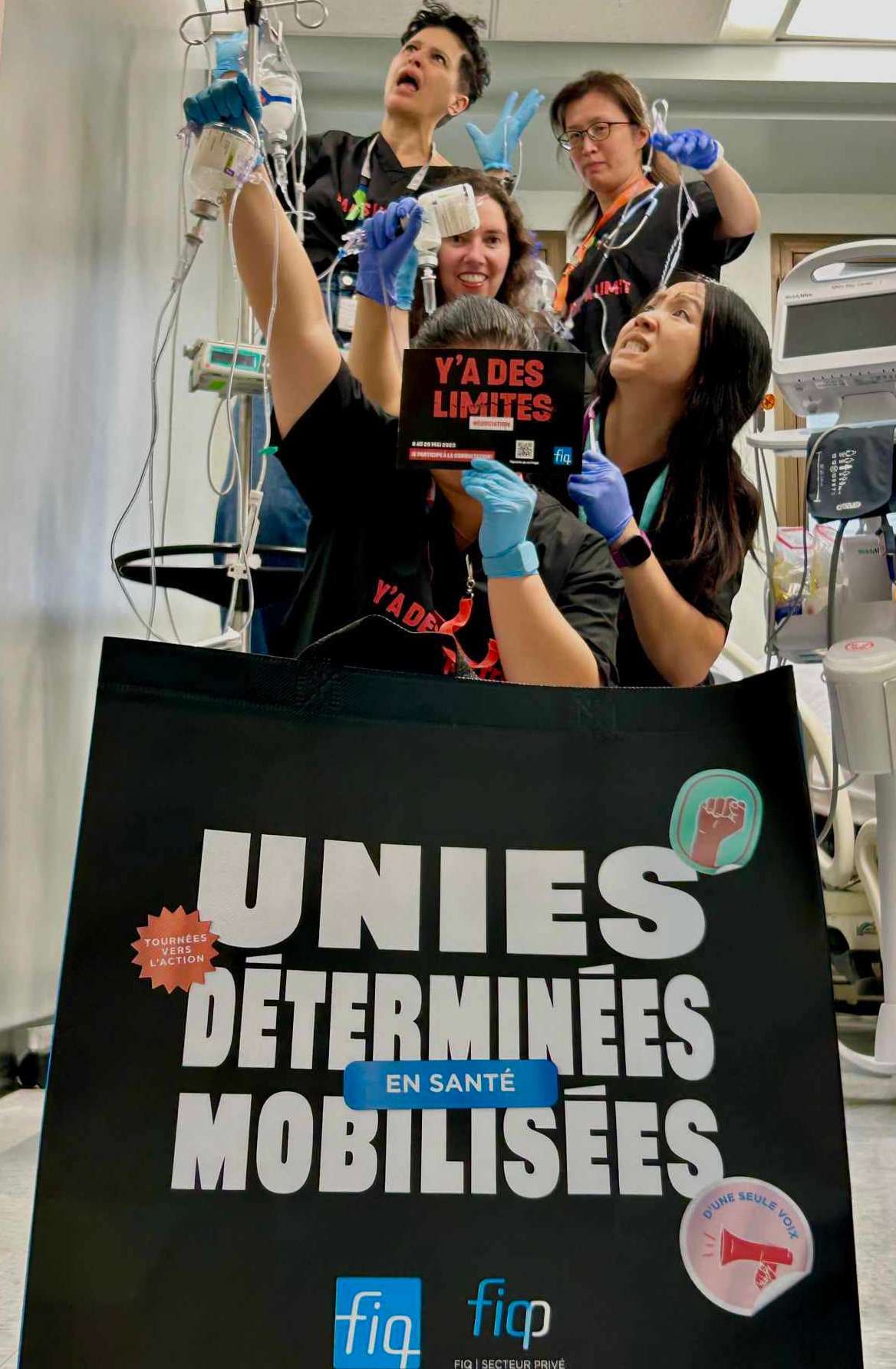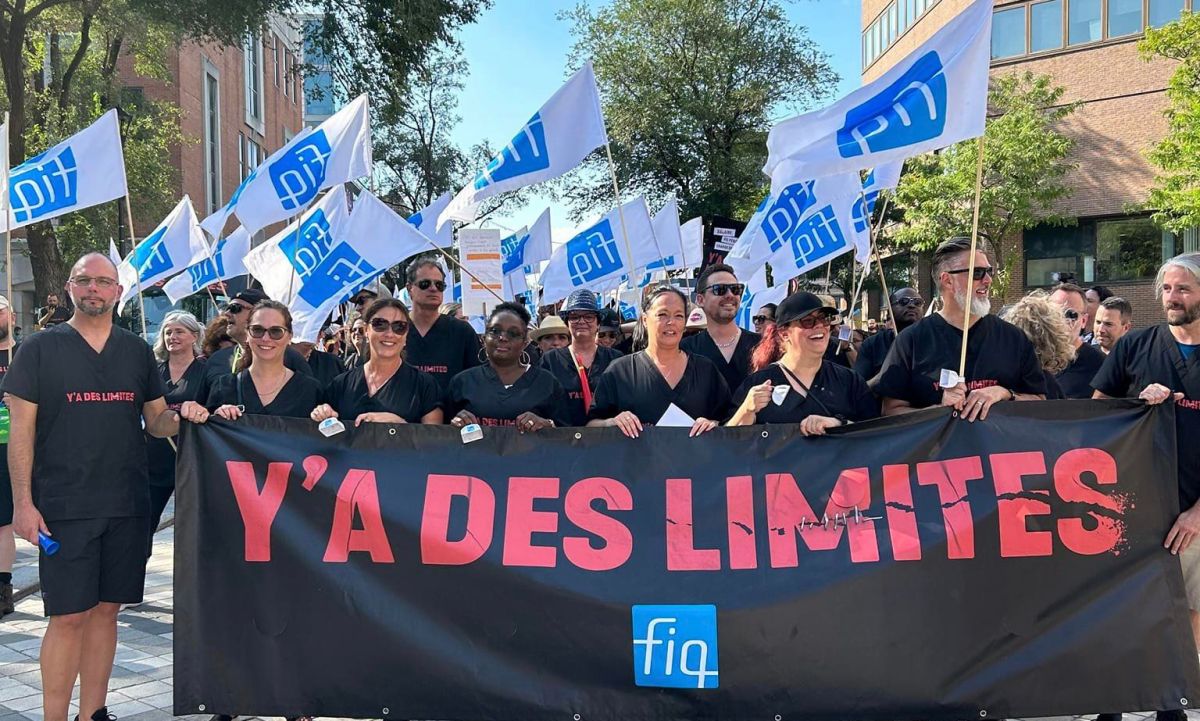September 22, 2023 - No. 52
Important National Day of Action in Quebec September 23
All Together with Public Sector Workers!
|
|
• Quebec Common Front Calls for Defence of Public Services
• Demand for Government to Assume Its Social Responsibilities
and Negotiate in Good Faith
Health Care
• "There Are Limits" Nurses Tell Government
• Solving Health Care Crisis from Nurses' Point of View
Quebec Government's Unacceptable Education Bill
• Changes to the System Must Be Based on Teachers'
and Education Workers' Experience
• Centralization of Powers in the Hands of the Minister
Under Pretext of Efficiency
Important National Day of Action in Quebec September 23
All Together with Public Sector Workers!
In Quebec, public sector collective agreements expired on March 31. This is a time public sector workers face the most brutal anti-social offensive and are fighting back. Their unions have once again formed a Common Front to raise awareness of their demands, their working conditions, and the urgent need for public funding of the public sector so that the needs of the society are met. Fifty years after the first Common Front was formed in 1972, the Confederation of National Trade Unions (CSN), the Quebec Labour Congress (CSQ), the Quebec Federation of Labour (FTQ) and the Alliance of Professional and Technical Health and Social Services Personnel (APTS) have joined forces to form an alliance and speak with one voice for this round of bargaining.
The Common Front is organizing a major national march on September 23, in Montreal, and invites everyone to participate. The call for the action says: "All persons who are closely or remotely affected, who know workers in our systems, who want to support our struggle and show the importance they attach to public services, now is the time to let your voice be heard loud and clear. We'll be needing all the voices we can get to join in with ours!"
 The Common Front points to the fact that the state of Quebec's
public services calls for ambitious solutions and openness to workers'
proposals. To halt the exodus of employees from the public system, the
Common Front is pointing to the need to improve working conditions to
attract personnel and retain those already employed in the health care,
social services and higher learning sectors. The government's approach
is diametrically opposed to this vision. To serve narrow private
interests which are competing for public funds, the government is
waging frontal attacks against the Government and Public Employees
Retirement Plan (RREGOP) to free up funds which they will abscond with.
This is hastening the retirement of a significant number of employees
approaching retirement age who need to do so to protect the pensions
they have counted on their entire lives. Public sector workers know
they will not be replaced because they know the government is set on
destroying the public system and serving private providers who make a
killing from guaranteed government contracts for their services.
The Common Front points to the fact that the state of Quebec's
public services calls for ambitious solutions and openness to workers'
proposals. To halt the exodus of employees from the public system, the
Common Front is pointing to the need to improve working conditions to
attract personnel and retain those already employed in the health care,
social services and higher learning sectors. The government's approach
is diametrically opposed to this vision. To serve narrow private
interests which are competing for public funds, the government is
waging frontal attacks against the Government and Public Employees
Retirement Plan (RREGOP) to free up funds which they will abscond with.
This is hastening the retirement of a significant number of employees
approaching retirement age who need to do so to protect the pensions
they have counted on their entire lives. Public sector workers know
they will not be replaced because they know the government is set on
destroying the public system and serving private providers who make a
killing from guaranteed government contracts for their services.
It is already known that a public system is far less expensive than a private system whose aim is to guarantee profits of private providers. Everyone also knows that a public system can be administered efficiently and that in order for this to happen, it must be provided with the newest technological advances and the human factor/social consciousness must be permitted to flourish.
"For us who have borne the burden of keeping education, health care, social services, higher education and government agencies going throughout the crisis, the pandemic has highlighted and exacerbated the problems inherited from decades of austerity: outdated facilities, disorganized networks, cumbersome administration, understaffing and overwork. Despite the uncertainties, the improvisations and the emergency decrees, we stood firm," the Common Front points out. Highlighting the unsustainability of the situation created by the government's lack of social responsibility, the statement of the Common Front points out that it is the remarkable adaptability and commitment of the workers that have kept the system afloat despite the lack of resources and the poor working conditions.
On the question of wages, the Common Front points out that after decades of austerity, cuts and wage freezes, the demands of public sector workers to bring their wages and working conditions in line with today's living conditions are justified and essential to ensure the sustainability of public services.
The statement points out that the organizations that make up the Common Front have a unanimous mandate to plan strategic strike action from the start of the new school year, which they have been working on for several weeks. The public sector unions say that the Common Front is a response to the government's attempts to divide, which do nothing but harm the public systems. "Beyond the dragged out negotiations, a long-term social vision is sorely lacking," the statement says.
All out to make the September 23 demonstration a resounding statement for the government to meet the public sector workers' demands!
All Out to Support Public Sector Workers!
Quebec Common Front Calls for Defence
of Public Services

Demonstration by Quebec public sector workers in Trois-Rivières, September 6, 2023
Quebec's public sector workers who provide services directly to the population include the nearly 600,000 workers in the health and social services and education sectors. They represents some 7.5 per cent of the Quebec population.
All these workers have been negotiating their contracts since March 31, 2023. What's more, workers in the health and education sectors, in addition to having to defend their demands within the limits imposed by the bargaining framework, while the government constantly pushes back, also have to deal with two bills that modify their working conditions and intensify the private sector's takeover of these sectors: Bill 15 in health and Bill 23 in education.
In health and education, the main demands are to reduce the ratio of patients and students for whom workers are responsible. In health care, whether under the theme of Humanizing Care and Services, put forward by the Federation of Health and Social Services (FSSS-CSN), or the demand of the Interprofessional Health Federation of Quebec (FIQ) for a safe patient-to-staff ratio, "a vital social project on which the safety of patients and care professionals depends," workers' organizations in this sector are demonstrating their level of awareness and confidence that their working conditions are decisive in protecting the population's health.
Quebec teachers and their colleagues are making the same demand. By recognizing the needs of young people, whether in terms of mental, social or physical health, or in terms of pedagogical support, education workers are also assuming their social responsibilities by demanding that the government establish conditions that enable them to meet these needs.
It is this awareness on the part of workers in health, social services and education that clashes head-on with the interests of those who control Quebec's wealth. At a press briefing on September 8, Premier François Legault said, "I do have some concerns about the disruptions announced by certain unions who will have the right to strike at the end of September."
This threat refers to public sector unions seeking strike mandates in the face of the government's refusal to negotiate working conditions and wages with them that would enable them to offer and deliver health care and education that meet the needs of Quebec's population.
The Common Front, which represents 420,000 workers and is made up of the Confederation of National Trade Unions (CSN), the Quebec Labour Federation (FTQ) and the Quebec Labour Congress (CSQ), will be consulting its members between September 18 and October 13 to vote on whether to strike. In addition, the Common Front is organizing a national demonstration on Saturday, September 23 to mobilize the population around its demands.
As for the other unions not part of the Common Front, such as the FIQ, which represents 80,000 nurses, their extraordinary Federal Council of September 6 and 7 declared that strike preparations are well underway. This pressure tactic has not been used by care professionals for 20 years.
The Autonomous Education Federation (FAE) is currently seeking an unlimited general strike mandate from its 60,000 teachers.
The people of Quebec must throw their full weight behind the just demands of public sector workers, because the services they provide and the care they deliver concern society as a whole.
(Photo: CSN)
Demand for Government to Assume Its Social Responsibilities and Negotiate in Good Faith

Common Front action outside CAQ caucus meeting in Jonquière, September 8, 2023
The Quebec government prides itself on the claim that Quebec is a society based on the rule of law. Labour relations laws exist that are said to provide a place for negotiation and stipulate that the parties "must negotiate in good faith and without undue delay." They also provide for the use of strikes -- "the concerted cessation of work by a group of employees" -- as a means of pressure "to bring the other party to change its position with regard to the negotiation of a collective agreement."
Yet on September 8, coming out of a caucus meeting of the governing Coalition Avenir Quebec, the Premier of Quebec François Legault spread outright disinformation about the demands and solutions put forward by Common Front workers, and more specifically by those in the health care sector. He said he didn't want to negotiate in public, although his government also refuses to negotiate at the bargaining table, and served the public sector workers an ultimatum that he wants "the collaboration of the unions" with "as little disruption as possible this fall."
As he often does, Legault tried to pit health care workers against "Quebeckers," saying that he is "the manager of Quebeckers' money" and raising "Quebeckers’ taxes" is out of the question. This means that meeting the needs of workers and the population is not possible, or that doing so would go against the "Québécois" of whom he claims to be the defender -- even though the reality is quite the opposite: improving working conditions and implementing the solutions put forward by public sector workers through their unions can only result in better health care for the entire population.
Refusing to negotiate in good faith, especially with workers who provide such essential care to society, is socially irresponsible and unacceptable. Acting in this way always brings to mind former Liberal premier Jean Lesage's famous phrase: "The Queen does not negotiate with her subjects." It's an admission of who is really represented in the current system of representation. Queen or not, by its own laws the government as employer must negotiate in good faith.
Remember that the Interprofessional Health Federation of Quebec (FIQ) has filed a complaint with the International Labour Organization against compulsory overtime, to put an end to this discriminatory management practice against care professionals, most of whom are women, and which undermines their health, safety and dignity. It is up to the workers themselves to determine what violates their dignity and their physical and mental integrity. It is a question of human rights, just as it is a social responsibility to put an end to the anarchy that reigns in public services. In this vein, as the FIQ's slogan says, "There are limits," and assuming our social responsibilities means ensuring that the government cannot indefinitely undermine these human rights, all while flouting its own rules.
(Photo: CSN)
Negotiating Committee Informs Affiliated Unions
on State of Negotiations and Receives
Their Instructions
 The
Interprofessional Health Federation of Quebec (FIQ) reports that
delegates from affiliated unions met in Laval on September 6 and 7
for an extraordinary federal council devoted to negotiations.
The
Interprofessional Health Federation of Quebec (FIQ) reports that
delegates from affiliated unions met in Laval on September 6 and 7
for an extraordinary federal council devoted to negotiations.
The Negotiating Committee presented the state of affairs at the bargaining table to representatives of the various affiliated health care unions. Negotiating sessions were held over the summer and the pace accelerated in September. Reactions were unanimous: the government must offer more to Quebec's health care professionals.
Although much work and discussion remains to be done, union representatives were able to express their views on some of the nonsense heard at the bargaining table. Among other things, the government wants more flexibility in establishing schedules and in the mobility of care professionals.
The union representatives sharply criticized the employer's offers and positions. They provided the Negotiating Committee with examples to bring to the bargaining table. They reiterated the need for real improvements to their working conditions, the recognition of the value of their members’ work and their remuneration.
At present, the progress of negotiations does not meet the expectations of union representatives, who want the government to be more receptive to the needs of members and act accordingly, to improve the working conditions of care professionals and recognize their contribution at its fair value.
(Photo: FIQ)
Health Care
"There Are Limits" Nurses Tell Government
Health care workers want real improvements in working conditions, recognition and pay.
On September 6, close to 500 nurses, nursing assistants, respiratory therapists and clinical perfusionists demonstrated in downtown Montreal to mark the stepping up of pressure and to indicate their exasperation with the government. They are campaigning for real progress at the bargaining table.
Commenting on the demonstration, Julie Bouchard, President of the Interprofessional Health Federation of Quebec (FIQ), said: "The government keeps saying it wants flexibility. It seems to want to reduce care professionals to interchangeable pawns with no life of their own. What the government wants is flexibility so its administrators can plug holes in schedules, at the expense of the workers on the floor. To prefer the comfort of managers over the needs of care professionals is to grossly misunderstand the serious and present problems in the network."

On the issue of shortages of personnel, Bouchard said: "Although most people don't know it, there is no shortage of nurses in Quebec, for example. According to the latest data, there have never been so many. The problem is that working conditions and wages in the public sector are so bad that very few want to continue working there. Care professionals are struggling to provide safe, quality care to the population."
"What we're experiencing," concludes the FIQ president, "is not a labour shortage, but an exodus of care professionals, a generalized cut-and-run. The President of the Quebec Treasury Board said there is a lack of clear priorities on our part, so here are a few: Give us the ability to prepare a birthday dinner for our children! Give us the ability to make a dental appointment without putting it off 50 times! Give us the certainty of being able to attend family gatherings planned months in advance! It's the only solution, otherwise the exodus will worsen, with disastrous consequences for care professionals and their patients."

(Quotations translated from original French by WF. Photos: FIQ)
Solving Health Care Crisis from
Nurses' Point of View

Quebec City, September 6, 2023
On Monday, August 21, Premier François Legault and the President of the Treasury Board Sonia Lebel met with Julie Bouchard, President of the Interprofessional Health Federation of Quebec (FIQ), in the context of contract negotiations for health care workers. Bouchard said of the meeting:
"Nothing was agreed during the meeting, but I made a point of expressing to Mr. Legault and Ms. LeBel that our members' expectations are immense, and will have to be met. The 80,000 care professionals we represent are impatient, and all means of pressure are currently being considered. Time is running out, and we need structuring measures, such as a law on safe ratios and the end of [mandatory overtime], to ensure the stability of care teams and improve the safety of care offered to the population.
"I've also made sure to make it clear to the Premier that [the workers] are the leading experts in the field, and that we know what solutions need to be put in place to turn around the public network. What we need is to be listened to and for the solutions we propose to be implemented. We're facing many challenges, not least the structural reform of the health care network [such as Bill 15, which contains 1,200 articles, 308 pages and amends 37 existing laws -- WF Ed. Note] and the government's strong tendency to focus on privatization, and these major issues will have an impact both on our working conditions and on access to universal, free care for the people of Quebec."
This principled stand demonstrates the courage and determination of Quebec nurses to win working conditions that enable them to deliver the highest levels of health care to the people of Quebec. All the more so since that very morning, Christian Dubé, Minister of Health, said in a Radio-Canada interview about opposition to the adoption of Bill 15: "I'd certainly prefer not to need a gag order, but if that's what it takes at some point, we'll do it, but we're not there at all right now."
The people of Quebec want to resolve this contradiction between the expertise of health care personnel and the control of decisions exercised in this sector by narrow private interests in favour of the people, not the narrow private interests.
(Photo: FIQ)
Quebec Government's Unacceptable Education Bill
Changes to the System Must Be Based on Teachers' and Education Workers' Experience

Teachers denounce Quebec government's education reform outside National Assembly, June 2, 2023
There is a consciousness in Quebec that major changes must take place in education to solve serious problems. Among these are the lack of teachers, students failing and dropping out of school, the lack of human resources to help teachers and their students, and the growing insecurity in schools that is a consequence of these problems.
Public opinion also recognizes that teachers, along with their colleagues in educational institutions, are the ones with the expertise to solve these problems in favour of a public education system that will serve the needs of society.
With Bill 23, introduced on May 4 by Education Minister Bernard Drainville, the opposite is true. The refusal to respond to the needs of the younger generation and the workers who educate them, from kindergarten to the end of high school, will make the situation even worse. The bill continues the Legault government's policy of restructuring the state so that all decisions rest in the hands of narrow private interests through ministers who are put there by these interests.
The principle of the public education system is based on society having reached a level of development where its future prosperity depends on the expansion of public services. The enormous development of the productive forces in Quebec and Canada, and the technological revolution driving it in all aspects of life, should translate into a corresponding growth in the capacity to meet the educational needs of citizens on all fronts.
Instead of assuming social responsibility, governments are directly captured by private interests and make anti-social decisions for private gain. We can be sure that in the weeks to come, private companies and organizations outside the education system will emerge from the wings.
In Bill 23 and the Minister's interventions, teachers have been reduced to things. They are to be dictated to in terms of the best practices and training deemed necessary by the Minister himself. Their role, according to the bill, is to increase academic results.
Quebec's education system is rich in the experience of nearly 100,000 teachers. A reform of the education system that does not take this into account must be rejected.
 Teachers
greet education minister at reopening of Mont Bleu school in Outaouais,
September 5, 2023, calling for action at the negotiating table to
ensure quality public schools for all.
Teachers
greet education minister at reopening of Mont Bleu school in Outaouais,
September 5, 2023, calling for action at the negotiating table to
ensure quality public schools for all.
(Photos: FAE)
Centralization of Powers in the Hands of the Minister Under Pretext of Efficiency

Teachers demonstrate in Montreal in defence of working conditions and public education,
September 19,
2023.
On May 4, Quebec Education Minister Bernard Drainville tabled Bill 23, An Act to amend mainly the Education Act and to enact the Act respecting the Institut national d'excellence en éducation.
At a press briefing, he introduced the bill saying that it "aims for efficiency but for student success, so it's efficiency to improve academic results in our schools."
The Larousse Dictionary defines the word "efficiency" as follows: The character of an efficient person or organization that produces maximum results with minimum effort or means. Its synonyms are efficacy and productivity.
To achieve this efficiency, Mininster Drainville gives three areas of guidance. The first guide concerns improved decision-making, which the law purports to address in this way: "[T]he general managers of service centres will be appointed by the government on the recommendation of the Minister. They will have renewable five-year terms. Each school organization will also sign an annual management and accountability agreement.”
The second guide concerns data accessibility. The bill provides for the creation of databases where school service centres will deposit their data, enabling the Minister, for example, "to see which schools or classes, even, have academic results that are below average and intervene through the school service centre. [...]"
The third guide concerns the identification of evidence-based best practices, to be done through the creation of the Institut national de l'excellence en éducation (INEÉ). This institute will be mandated to "ensure that they are used in classrooms by our teachers."
Whereas in the current Education Act, it is the Boards of Directors that can appoint and dismiss the Directors General of School Service Centres (SSCs), the key managers, the bill gives the Minister the power to overturn a decision of the SSCs and or fill a vacancy on the Board of Directors of an SSC, the bill now puts these decisions in the hands of the Minister. In addition, SSCs will be required to enter into an annual "management and accountability" agreement with the Minister on whether or not they have achieved the objectives imposed by the Minister, including those related to national indicators, objectives and orientations.
The 36-page bill amends ten statutes, and enacts the National Institute for Excellence in Education Act. It is characterized by the concentration of powers in the hands of the Minister of Education. Under Bill 23, school governance would be overhauled, giving the Minister the power to appoint or dismiss superintendents of SCCs. The Minister would also be able to overturn a decision made by an SCC when that decision is not in line with the targets, guidance and directives established by the Minister, or, as the Minister put it, to "make the decision that, in his or her opinion, should have been made."
The bill creates the INEÉ as a legally constituted agency of the State. Its Board of Directors is made up of nine people, including a single teacher, appointed by the government, on the recommendation of the Minister, to carry out its mission of "promoting excellence in educational services in preschool, primary and secondary education." This means, among other things, that the institute must identify best practices based on "available scientific knowledge, in Quebec and elsewhere [...] contribute to the training and support of school personnel, formulate, when requested by the Minister, an opinion on the definition of the competencies expected of preschool, primary and secondary school teachers for the purpose of obtaining a teaching permit, and formulate [...] an opinion on teacher training programs for preschool, primary and secondary school teachers."
In addition, "the Institute may enter into agreements with any group or organization in a position to provide it with the information required to develop its recommendations. It may also enter into an agreement with a government other than that of Québec, one of its departments, an international organization or an agency of that government or organization." In other words, both through its directors and these provisions, decision-making in education is taken over by narrow private interests.
The bill allows the Minister to develop regulations that will allow him to impose distance education (art. 449) and teacher training, as well as conditions "relating to the recognition of the content of training activities, the methods of control, supervision or evaluation of continuing education obligations and, where applicable, cases of exemption" (art. 457).
The bill amends the Loi sur le Conseil supérieur de l'éducation, including its title, to replace the name "Conseil supérieur de l'éducation" with "Conseil de l'enseignement supérieur" to circumscribe the council's function to matters relating to higher (university) education, and to revise its composition.
The bill introduces the creation of a centralized education repository and reporting system to "support the management of the education network by simplifying communications." It allows the Minister to make it mandatory for certain organizations to use this system for hosting and communicating information. It also provides that the Minister may require certain organizations to use any information resource service he designates, including a decision-making tool.
(Photo: FAE)
Bill 23 – Who Said What?

Teachers set off smoke sticks to denounce the smoke screen of the Quebec government's education reform, June 2,
2023.
As soon as Bill 23, an Act to amend mainly the Education Act and to enact the Act respecting the Institut national d'excellence en éducation, was tabled on May 4, many organizations in the education community voiced their serious concerns about the bill. In many respects, they question the claims of efficiency, excellence and accountability in the name of the young generation's academic success, especially since the expertise, demands and field experience of the key players in education -- teachers and their colleagues -- are quite simply discarded. The following are extracts from public statements and briefs by various players in the education world.
Autonomous Education Federation (FAE)
The FAE demands the withdrawal of the bill:
May 4, 2023 will go down in history as a dark day for Quebec's public schools. The tabling of Bill 23 in the first session of the 43rd legislature is a stab in the back for the teaching profession on the issue of professional development, in parallel with the over-centralization of the education network. No concrete solutions to the ills afflicting public schools are to be found in this piece of legislation. This attack on the people who work every day to carry out the mission of public schools is being carried out in the midst of collective bargaining, which in the case of some elements of this bill, amounts to special legislation threatening to dictate working conditions. The employer side intends to impose through legislation what cannot be agreed on fairly with the FAE during contract negotiations.
[...]
Statecraft, the best interests of public schools, and intellectual honesty demanded that this Minister move forward transparently, and that he submit these proposed changes in the context of a consultation, a white paper or a draft bill, thus allowing all organizations and individuals concerned to put forward their point of view, before rushing to pass legislation. To add insult to injury, this bill not only threatens and sabotages the Education Act, but also contains two other sections that would have required their own bills: the first, to create the Institut national d'excellence en éducation, and the second, to amend the Act respecting the Ministère de l'Éducation, du Loisir et du Sport. By proceeding at the end of a parliamentary session, with no prior consultation other than a 45-minute exchange of views in the parliamentary committee, stakeholders with a different vision of public schools will find it difficult to put forward their proposals.
Based on these findings [...] the FAE demands that this bill be withdrawn.
Quebec Labour Congress (CSQ)
The CSQ has also submitted its concerns about the consequences for the education world of the bill's adoption:
1. Increasing the Power of the Minister
The first aspect concerns the provisions of the bill, which, if adopted, would allow the Minister of Education to recommend the appointment of superintendents, who would then appoint school principals. "We see here a transformation of the line of authority that allows the Minister to have greater control over establishments," said Nathalie Chabot, CSQ Professional Action Advisor.
Another provision of the bill: the possibility for the Minister to overturn decisions made by school service centres if he or she is of the opinion that they do not correspond to the orientations or objectives set.
2. Data Collection and Use in Education
The bill proposes to set up an information-gathering system to obtain an overview of the education network. "The question is how the Minister will use this data. How will the data be used? What is the Ministry aiming for? What does it mean by a high-performance school network? Could the data be used to further reinforce schools' obligation to achieve results, regardless of the context and resources at their disposal? That's what the bill suggests. Because objectives, targets and obligations to achieve results have already been played out several times over the past twenty years, and we're well aware of the potential pitfalls," says Éric Gingras. The way they are used could lead to abuses.
3. Strengthening Results-based Management
The bill reflects a narrow conception of educational success, where the school is no longer defined as an institution that is a living environment, but as an organization mobilized around results.
4. Setting Up a National Institute for Excellence in Education
The last issue mentioned is the creation of a national institute for excellence in education, whose aim would be to synthesize research and identify best teaching practices.
The creation of this institute can be seen in conjunction with other provisions in the bill that further limit ongoing training obligations, particularly for teachers.
"The combination of these four components opens the door to greater control over the practices of school staff, particularly teachers, and makes changes in practice the only way to improve success," explained Nathalie Chabot.
Federation of Education Unions (FSE-CSQ)
The FSE also discussed the creation of a national institute for excellence in education, as proposed in the bill:
The project to create the Institute is not neutral. From the outset, the project has been supported by a certain current of research, that of evidence-based education and school effectiveness. [...] Sihame Chkair, who co-edited the book Les données probantes et l'éducation published in 2023, points out that the rise of evidence-based education is linked to the context of new public management and neo-liberal policies. This methodology then takes on a political character by becoming the lever of educational reforms. Bill 23 is a step in the same direction.
According to proponents of the effective school, to increase academic success [...] we must rely on the "teacher effect" and the adoption of certain pedagogical practices. On the other hand, class composition, workload, shortages of qualified staff and the social determinants of success are not priority issues, despite the findings of research on these questions. [...] The creation of a national institute for excellence in education runs the risk of placing all the work needed to improve success solely on the shoulders of teachers, without taking into account the other factors that contribute to success and ignoring the various currents of research.
Josée Scalabrini, President of the FSE-CSQ adds:
As teachers, we are the experts in pedagogy. We are trained to choose the right pedagogical methods according to the students, the programs, the learning context and the resources available. With the abolition of the Conseil supérieur de l'éducation -- whose opinions often displeased the political powers that be -- and the creation of an Institut national d'excellence en éducation (INEÉ), Minister Drainville will give a certain current of educational research the right to impose its point of view. After having had the socio-constructivist approach and project-based pedagogy of the reform imposed on us, it is now the "effective school" approach that they will try to impose on us as the only valid way of doing things. Let's not forget that education is a human science where a healthy diversity of currents of thought co-exist and occasionally clash.
Quebec Provincial Association of Teachers (QPAT)
What we must avoid is using the so-called evidence-based results of this research to impose or generalize practices in school settings. We insist on the fact that teachers, given their expertise, are always the best placed to determine the most appropriate approaches based on the specific characteristics and needs of their students. [...]
An education system does not gauge production by consistent inputs. It deals with students who are human beings from varied family and socioeconomic backgrounds, who present a diversity of characteristics that are unique to them, and who evolve in a classroom setting (class composition) that varies from one school to another.
Attempting to use simplistic measurements to compare their performance leads invariably to valuing the measurement rather than the overall learning process. In this context, with the pressure to reach targets set by the Ministry, it becomes tempting to take shortcuts to produce results that meet expectations, instead of ensuring that the learning process is rich and meaningful for students. If adopted as is, Bill 23 will exacerbate this reality instead of improving the academic success of students and further fuel competition and the excesses that flow from it.
Confederation of National Trade Unions (CSN)
The CSN is calling for the bill to be dropped. It also points out that the bill continues the government's tendency to centralize educational decisions in its own hands:
"Previous reforms were supposed, according to the government, to bring decision-making closer to the field and to parents. At the time, we feared the effects of increasing the powers of the Minister and the disappearance of school boards and their universally elected chairs and commissioners, who were accountable to their communities. Today, it's clear that this was merely a prelude to further centralization. Indeed, the Minister of Education says he is building on his reforms to go even further, by granting himself new powers, including that of choosing superintendents, overturning decisions made by school service centres and imposing management and accountability agreements on them.
As for the bill's change to the mandate of the Conseil supérieur de l'éducation for the elementary and secondary levels, the CSN says it's "a colossal loss for the education community, from kindergarten to university.
"The Conseil supérieur de l'éducation was founded in 1964, at the same time as the Ministry of Education. It has a proven track record, its expertise is recognized and its independence is an indispensable element."
Quebec Federation of University Professors (FQPPU)
The Minister of Education, Bernard Drainville, recently stated in an interview that he had only one ambition for his mandate: to improve academic success. Yet, by proposing the abolition of the Conseil supérieur de l'éducation (CSE), his reform bill not only attacks an independent voice whose fundamental mission is to advise the government and inform the public. The proposed legislation also promotes a vision of education that may well harm the very students the Minister claims to serve, and does so without prior consultation. [...]
In light of this, the FQPPU urges the Minister of Education to reverse his decision to abolish Quebec's flagship Conseil supérieur de l'éducation, and to listen to the voices raised against the creation of the INEÉ. Rather, the evidence he holds dear justifies tackling head-on the problems raised by the education community and ignored by this reform -- those of inadequate funding and the deplorable working conditions of teachers in the network. Finally, better funding for research in the educational sciences and related fields would make it possible to remedy some of the shortcomings identified by the Minister, without the results being bent by any ideological bias whatsoever.
(Photo: FAE)
(To access articles individually click on the black headline.)
Website: www.cpcml.ca Email: editor@cpcml.ca




